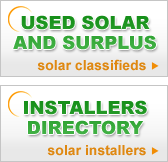Residential renewable energy state income tax credit:
-The state of Massachusetts allows a 15% tax credit against the state
income tax for the entire cost of a renewable system including installation
up to $1,000.
-Eligible renewable systems include solar photovoltaics, solar water,
solar space heating and wind energy systems.
-Excess tax credit may be forwarded for three years.
-Systems must be new and meet all safety and performance standards
to qualify for this credit.
Mass Energy – Renewable energy certificate incentive:
-Mass Energy buys renewable energy credits from photovoltaic systems
as well as small wind energy systems and sells those REC’s combined
with hydro and biomass REC’s as a New England GreenStart product.
-Purchasing renewable energy certificates allows customers who do
not have their own solar or wind system to support and use renewable
energy in their home instead of conventional electricity.
-The Energy Consumers Alliance of New England purchases REC’s
from Massachusetts renewable energy systems at $30 per megawatt hour
($0.03 per kilowatt hour) for three years.
Renewable energy property tax exemption:
-Residential solar energy or wind devices installed to heat or cool
a structure, generate electricity or provide heat to be used in the
structure are 100% exempt from property taxes.
-Eligible systems include photovoltaics, solar water heat, solar thermal
electric wind, and hydroelectric.
Renewable energy equipment sales tax exemption:
-In the state of Massachusetts, solar energy equipment, geothermal
equipment and wind equipment are 100% exempt from state sales tax.
Commonwealth solar rebates – Massachusetts Technology
Collaborative:
-This State rebate program provides incentives for the installation
of photovoltaics that are grid-tied to customers of participating
Massachusetts utility companies.
-Base incentive amount is $1.00 per watt. Incentive amounts may vary
depending upon PV system size and home value.
-PV systems must have a minimum 5 year warranty and must meet all
safety and performance standards and installation requirements to
qualify.
Utility-sponsored loan and solar rebate programs:
-Many utility loan and rebate programs are available throughout the
state of Massachusetts, provided by municipal cities and utility companies.
-Information and details on all the different programs are available
on the internet.
-Details and requirements for each program will vary.
-Loan and rebate programs are generally available for customers who
install solar photovoltaic and solar water heat systems. Loans are
also available to make energy efficiency improvements as well.
-Loans are usually 0% interest or low interest loans to help with
the purchase and installation of solar and other energy efficiency
technologies.
-Rebate amounts are typically determined by a per-watt AC basis and
depending on the system’s size and applicable sector.
Residential renewable energy tax credit:
-This personal tax credit allows the taxpayer to claim a credit of
30% of expenditures including labor costs and installation of qualified
residential solar-electric systems, solar water heating systems or
fuel cells. Small wind-energy systems and geothermal heat pumps can
also be accredited for.
-Solar-electric systems and solar water heaters have a maximum incentive
of $2,000 if placed in service before 2009. There is no maximum incentive
for systems placed after 2008.
-The excess amount of the federal tax credit may be carried forward
to the next taxable year if it exceeds tax liability.
-This can be carried forward until 2016, but after that, it is unknown
if the unused credit will be able to be forwarded.
Residential energy conservation subsidy exclusion:
-This is a personal exemption of 100% of energy conservation subsidies
provided by public utilities.
-The value of a purchase or installation of any energy conservation
measure by a customer such as solar water heat, solar space heat or
photovoltaics will not be included in the customer’s gross income.
-Customers of an electric utility company, who participate in the
utility’s energy conservation program, may receive a rate reduction
of electricity furnished or a nonrefundable credit against the purchase
price of the electricity on each monthly electric bill.
Energy-efficient mortgages:
-This is a federal loan program where homeowners can use EEM (energy-efficient
mortgages) to finance renewable energy technologies in a home.









